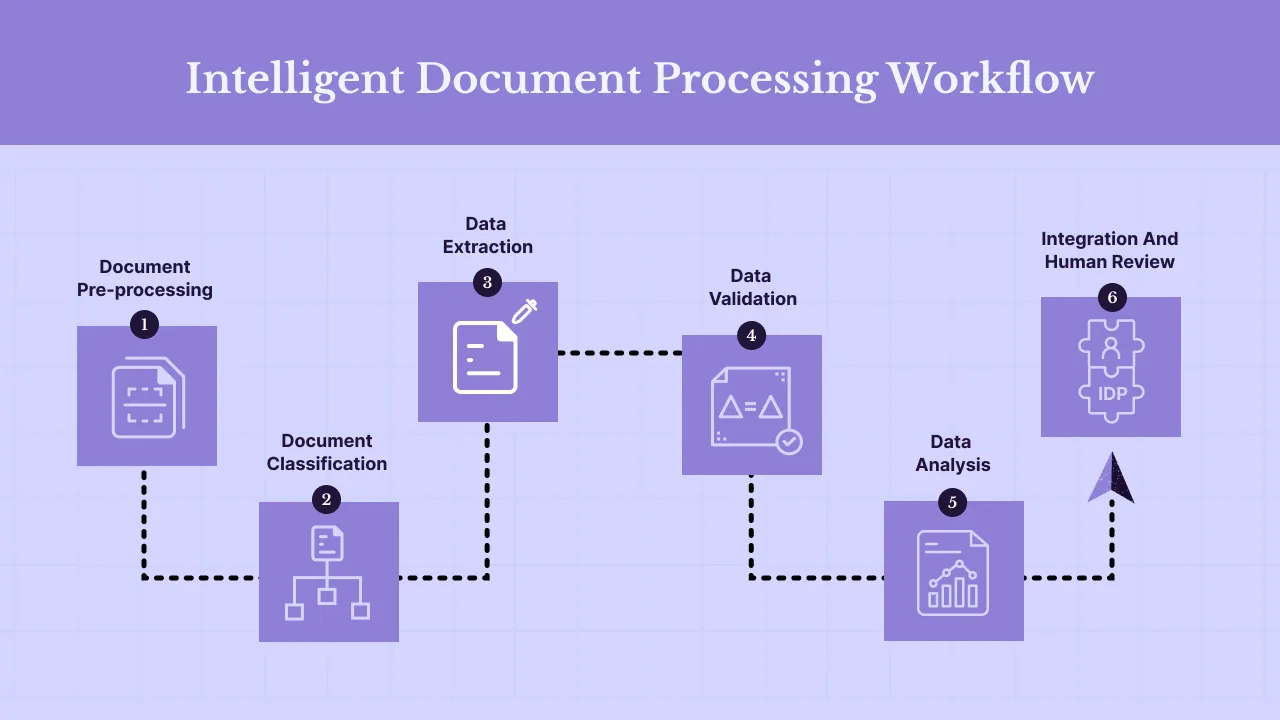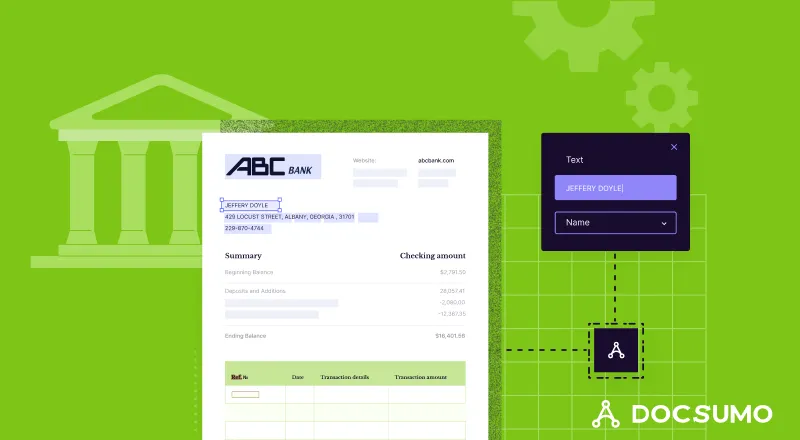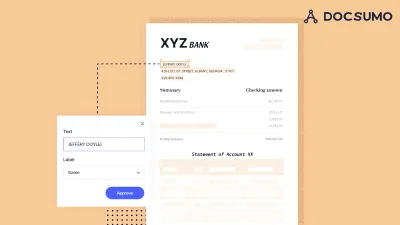Intelligent Document Processing in the Commercial Real Estate Industry
Explore the potential of Intelligent Document Processing (IDP) in commercial real estate. Discover how AI-powered automation simplifies document management workflows, enhances accuracy, and drives efficiency in lease management, property acquisition, compliance, and more.
.webp)
The real estate industry deals with thousands of documents every year. Traditional methods have failed to keep up with the tech leaps achieved in the last two decades, and it takes enormous time and effort to process them manually. Since most of the documents have unstructured data, more often than not, they need to follow a predefined structure. This slows down operations, which could be a better sign for a fast-moving industry.
Nevertheless, Intelligent Document Processing (IDP) in commercial real estate is a promising approach. It can overhaul the way commercial real estate paperwork is managed. IDP works on top of automation and AI to streamline data extraction, processing, and analysis. IDP enhances accuracy and drastically reduces processing times by unified handling of various documents, contracts, and financial statements. This allows teams to focus on more valuable, strategic activities.
Looking forward to 2030, a report from Grand View Research projects that the global IDP market is set to be valued at $11.29 billion (with a compounded annual growth rate of 30.1%). It is on the cusp of a breakout across various industries, including the commercial real estate industry.
In this blog, we will discuss how Intelligent Document Processing is transforming the commercial real estate industry, highlighting its benefits and the trends shaping its future.
Understanding intelligent document processing in commercial real estate
Intelligent Document Processing (IDP) in commercial real estate combines key technologies that automate the extraction and processing of data from complex documents. These technologies include Optical Character Recognition (OCR), Natural Language Processing (NLP), and Machine Learning (ML).
OCR technology scans the documents and converts images into searchable, editable text. Subsequently, NLP helps understand the text, which is crucial for complex documents like contracts. Lastly, Machine Learning improves accuracy as it continuously learns from processing and corrections.
Typical workflow of IDP in commercial real estate

The workflow of IDP in commercial real estate is designed to optimize the efficiency and accuracy of document processing. Here’s how it typically unfolds:
- Data gathering: Gathering documents such as lease agreements, tenant applications, property management contracts, financial reports, etc for ingestion involves collecting them from various sources. These sources include emails, scans, and digital formats.
- Pre-processing: OCR technology is used to convert images to text. The text is then cleaned and standardized.
- Classification: Machine learning algorithms categorize documents into types (e.g., leases, agreements, invoices).
- Extraction: NLP extracts key data points. These include dates, amounts, and party names.
- Validation: To ensure accuracy and consistency, the user must cross-verify the extracted data with internal databases and external sources.
- Integration: The verified data is then added to the main database or relevant systems for further use.
IDP automates everyday tasks. These tasks include pulling important terms from leases. They also include sorting documents by their content and checking data against known datasets. This is to prevent errors.
Integrating IDP solutions in commercial real estate existing systems
Intelligent Document Processing solutions are not stand-alone. They aim to boost and easily integrate with existing IT systems in real estate companies. For example, they connect with Property Management Systems (PMS) to automate lease information. Moreover, they are linked with accounting software to simplify tasks like invoicing. They also work with Customer Relationship Management (CRM) platforms, which they use to improve customer service and retention.
Real estate firms can use IDP solutions to ensure data flows across all platforms and to avail themselves of various other Intelligent Document Processing benefits. This cuts manual entry and data silos. It also boosts efficiency and cuts the chance of errors.
Benefits of intelligent document processing in the commercial real estate industry
IDP transforms the commercial real estate sector. It boosts operational efficiency and decision-making. Here are some of the key advantages:
.webp)
1. Improved accuracy
One of the foremost benefits of IDP is the significant improvement in data accuracy. IDP automates data extraction and processing from documents. This reduces manual and common entry errors. Accuracy is key for lease terms, payment schedules, and property details. It directly impacts financial and operational success. Better accuracy means decisions are based on solid data. Thus, it leads to improved contract and agreement management.
2. Increased efficiency
IDP increases workflow efficiency tasks like sorting documents and entering data, which used to take hours or days, now take only minutes. This quick process lets operations teams handle more documents without lowering quality. It's particularly helpful during busy times or when managing large property portfolios.
3. Cost savings
IDP simplifies document handling, cutting manual labor costs for real estate firms. It also slashes the need for physical storage. By managing data digitally, companies can avoid paper-based systems and also contribute to green initiatives. Plus, it speeds up document processing, improving resource use, cutting overhead, and boosting profits.
4. Enhanced compliance
In commercial real estate, meeting regulatory aspects is a significant challenge. From getting the building codes and safety standards right to adhering to evolving environmental regulations, proper documentation is the key to navigating the muddied regulatory waters.
A niche IDP system ensures that all documents follow the guidelines for automated workflows with relevant checks. This includes data privacy, record-keeping, and financial rules. This prevents violations and thus prevents breaches that can be costly and damaging to a company's reputation.
5. Streamlined decision-making
IDP helps real estate pros quickly access and understand data from documents, aiding fast decision-making. It also improves strategic planning and risk management, allowing them to better adapt to market changes. Whether checking a property's worth or managing assets, IDP offers key insights to make better choices.
Challenges of intelligent document processing in the commercial real estate industry
IDP has big benefits. But, many challenges can hurt efficiency and decision-making in commercial real estate. Here's how to navigate them:

1. High volume and variety of documents
Challenge: Commercial real estate deals with many document types, including leases, contracts, certificates, and reports. Each document type presents its format and complexities, making it difficult to standardize and automate the data extraction process effectively.
Solution: Strong IDP solutions have advanced OCR and NLP. They make managing various documents easier. Regular training and updates help the system adapt to new formats and structures, ensuring consistent performance.
2. Data accuracy and quality
Challenge: The accuracy and quality of data extracted from documents are critical. Errors in data extraction can lead to significant misjudgments in property valuation and risk assessment, potentially resulting in substantial financial losses.
Solution: Adding checks to the IDP system improves data quality. Including human reviews in key processing steps ensures important data is checked twice.
3. Integration with existing systems
Challenge: IDP solutions must seamlessly integrate with existing IT infrastructures, such as property management software and CRM platforms. These systems often have complex and varied designs, which can complicate the integration process and limit the effectiveness of IDP solutions.
Solution: Choose IDP solutions with flexible APIs for better integration. Also, team up with IDP providers for custom solutions. This approach meets specific needs and reduces disruption.
4. Regulatory compliance
Challenge: The real estate industry is heavily regulated, and laws are continuously evolving. This includes regulations related to real estate transactions and data protection. IDP systems must ensure compliance with these regulations to avoid legal penalties and protect client data.
Solution: IDP systems should be designed with compliance in mind. They should have features that meet legal standards and make updates easy as rules change. Regular audits and updates are essential to staying compliant.
5. Cost and resource intensive
Challenge: Setting up and maintaining IDP systems is expensive and resource-intensive.
Solution: Strategic planning for IDP systems can evenly spread costs and resources. It also allows for a step-by-step approach, making it easier for staff to adapt.
6. Security and confidentiality
Challenge: Protecting sensitive data is key for IDP systems. Breaches can lead to legal trouble and lost trust.
Solution: It is crucial to use strong security measures, such as encryption, access controls, and regular audits. Additionally, it is vital to choose IDP providers that comply with industry-standard security practices.
Maximize the benefits of Intelligent Document Processing (IDP) in your real estate operations with our comprehensive eBook. Inside, you'll discover a bunch of practical solutions to common challenges and various advanced tactics that enhance the effectiveness and security of your IDP setup. Gain the insights you need to optimize your processes and drive success now.
Real-world applications of intelligent document processing in commercial real estate
Despite significant digital advancements, the real estate industry continues to handle a vast array of complex documents such as sale agreements, mortgage documents, lease papers, and legal contracts. These documents can be extensive, often running into hundreds of pages.
Intelligent Document Processing (IDP) offers several practical applications in the sector, enhancing the efficiency and effectiveness of company operations. Here are some key use cases:
1. Lease management
An IDP system can enable commercial real estate enterprises to automate lease agreement processing. It starts with information extraction from relevant lease agreements. The information is then forwarded to downstream tools, such as an ERP system. In the AI age, paralegals (and lease administrators) should not go through the documents and extract details to construct a lease abstract.
Modern IDP systems simply nullify the need for the costly and delayed nature of the "stare and compare" approach and replace it with automated lease abstraction. They classify the images typically found on the lease agreements based on several criteria - location, property type, size, etc. The expedited process also makes it easier for the real estate management to analyze the resulting data to uncover lucrative outcomes.
2. Co-piloting real estate interactions
Real estate managers can leverage IDP as a powerful copilot for many real estate interactions - property acquisition, lease negotiation, tenant requests, and much more.
For instance, in commercial real estate, it is common to have certain clauses in the contract owing to liability, routine maintenance, legal changes, etc that can be triggered over the long term. Having an IDP with integrated downstream applications can seamlessly maneuver the whole process. For high-stakes ventures - like a commercial lease diplomacy with an organization, warehouse, or retail entity — the IDP solution can funnel in all the information and its allied apps can duly prepare a negotiation transcript.
3. Vendor and supplier management
Construction sites are always stirring with activity; each new cargo requires documentation at various stages. Each new cargo generates a new Bill of Lading adding to the paperwork that needs to be processed. IDP automates the processing and classifying documents related to vendors and suppliers - contracts, bills of lading (BOL), invoices, service agreements, and much more. It enhances workflow and payment processes too. However, it doesn't just stop there.
Additionally, insurance claims are natural in the real estate sector during the construction phase. A lot can go wrong and modern IDP solutions can accelerate insurance claims processes.
4. Financial reporting and deal execution timeline
IDP enables the automatic gathering and combining of financial data from many documents. From accurate financial reporting and compliance to deal execution timelines, it positively impacts each sphere.
Additionally, the streamlined deal execution timeline facilitated by IDP helps close transactions more swiftly, giving your real estate business a competitive edge in a fast-paced market.
5. Tenant management and rent collection
It's a known fact that the efficiency of tenant screening hinges on the swift and accurate processing of tenant applications. Property managers long for a lightning-fast process while maintaining stringent accuracy standards to guard against future fallouts. IDP helps manage tenant records. It also automates rent collection. Therefore, it reduces errors and improves tenant relations.
For example, An IDP system integrates with CRM platforms. It updates tenant logs and payment records automatically. This setup makes rent collection and tenant management easier.
Case Study: Automating portfolio management for multifamily properties at Westland
Westland Real Estate Group, a key player in managing multi-family properties, used Docsumo's technology to improve its portfolio management. They struggled with the large and complex property documents. So, they sought Docsumo's help to simplify their work.
Westland used Docsumo. It automated data extraction from documents like lease agreements and maintenance records. This saved time and boosted accuracy and efficiency.
Impact of Docsumo on Westland:
- Reduction in document processing time by over 50%.
- Increase in data accuracy, reducing errors in tenant and property information.
- Enhanced decision-making capabilities with real-time data access and insights.
To witness how Docsumo turbo-charged Westland’s property management ops, here is the complete case study.
Enhancing commercial real estate operations through Docsumo’s IDP
Intelligent Document Processing (IDP) is transforming the commercial real estate industry by streamlining the management of extensive and complex documentation. Docsumo’s offerings are at the forefront of this transformation. Using cutting-edge AI technologies, Docsumo’s intelligent document processing software enhances document processing capabilities within the real estate sector.
The company leverages Optical Character Recognition (OCR), Natural Language Processing (NLP), and Machine Learning (ML) to automate tasks that are traditionally time-consuming and prone to errors. This improves the accuracy and efficiency of document processing and ensures adherence to regulatory standards.
By integrating Docsumo’s IDP solutions, commercial real estate firms can allocate more resources toward strategic decision-making, significantly enhancing operational efficiency.
Key outcomes with Docsumo:
- As much as 70% processing time reduction, enabling speedier completion of important real estate transactions.
- Improvement in data accuracy, minimizing the risk of costly errors.
- Apps for streamlined workflows interface with current CRM and property management systems, resulting in raised output.
Ready to upgrade your document management system and boost efficiency with Docsumo? Connect with us now to discuss your needs. It’s time to improve your document processing strategies.
Frequently Asked Questions
What problems does intelligent document processing solve in commercial real estate?
IDP addresses slow document turnaround, high error rates in data entry, and inefficient data management. By automating document processing, IDP reduces manual workload and enhances data reliability. For more on how IDP tackles these problems, see Intelligent Document Processing Use Cases.
What documents can be processed using intelligent document processing in commercial real estate?
IDP can process various documents, such as contracts, leases, invoices, compliance certificates, and financial statements. Its solutions are flexible enough to accommodate different document formats and structures.
How does intelligent document processing improve efficiency and accuracy in commercial real estate operations?
Intelligent Document Processing enhances efficiency by automating the extraction, sorting, and checking of document data. Advanced algorithms improve accuracy, reducing human errors and ensuring consistency in data handling.

.png)


.webp)


.webp)
.webp)
.webp)
.webp)